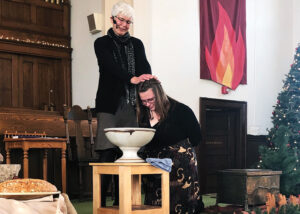At times we have been both inspired and overwhelmed by the parenting books that crowd bookstore and library shelves. We have also found useful advice, and a dauntingly high bar, in countless parenting blogs and social media posts. This abundance of resources is one indication that we live in a society that takes child-rearing very seriously.
As parents, we are expected to structure our lives around the best interests of our children. We should curate meaningful experiences and relationships, and advocate for them within the school and healthcare systems. Our identity as parents is intertwined with the successes and failures of our children as never before.
It seems to us that changing expectations around parenting must be impacting faith communities as well. After all, shouldn’t we put the same level of intentionality and thoughtfulness into nurturing our children’s faith as we put into every other dimension of their lives? Don’t we want high-quality Christian education and youth programming? Aren’t we grateful that Mennonite churches are putting more of an emphasis on faith formation? Absolutely!
As we reflect on our own experience as parents, however, we are humbled to realize that our efforts to introduce and welcome our children into our own particular family of faith have often lacked the intentionality and thoughtfulness it deserves. While we have genuinely sought to embody the gospel vision in our life together as a family, our words and explicit teachings have typically been preoccupied with more mundane matters: Can’t you solve the problem without yelling at each other? How much screen time have you had today? Did you put away the laundry?
In the midst of the busyness of life, we wonder how we can make our faith as visible as an emblem on our foreheads. When do we actually teach our children our values, helping them to understand what motivates our decisions and our actions? Let’s consider three values prominent in the Anabaptist-Mennonite tradition:
Peace
Although our family certainly struggles to be peacemakers, peace is one distinctive value that our children are quick to name. One key element to Christ’s call to peace for us has been the rejection of violence, and there are innumerable ways we have underscored this for our children, including—predictably—exerting control over the books, movies and games they were exposed to when they were young. Another key element is to clearly place our loyalty and devotion to God above loyalty to political authorities and military might.
One symbol of this conviction when we lived in the U.S. was asking that our children be excused from reciting the Pledge of Allegiance at school. Surprisingly, when we moved back to Canada we still felt like outsiders as we processed our children’s experience of a Remembrance Day ceremony at their new school. Whether this was because we were living in Ottawa, our nation’s capital, or because the perspective of the Canadian government and society had shifted during our absence, we struggled to know how to encourage our children to remember and acknowledge the pain and sacrifice war involves without glorifying or condoning it.
How, we wondered, could we encourage our children to think differently from their peers when there isn’t an obvious or non-threatening rationale for why they don’t fit in—such as being a citizen of another country?
One way we grappled with this question the following year was to join another family from our church in marking “Peace Day” on Nov. 11. Skipping out on school and work, we gathered together for what would go on to become a sacred tradition. We emphasized peace with creation while taking a hike, peace with others while eating food from a place in the world that was in conflict, peace with ourselves through artistic expression, and peace with God as we prayed and sang together.
As the clock approached the 11th hour during our activities, we often heard the sound of fighter jets flying over Parliament Hill—a reminder that we continued to be very much in the world even if we were not fully of it. For one day we and our children felt set apart, but we also felt a sense of connection to each other, and to others in our faith tradition far removed from us in time and space.
Community
Given that our family has moved on several occasions, a big part of our journey as parents has been seeking out connections with people in new cities, and centreing this effort on a community of faith has been our natural starting point. Indeed, as Anabaptist Mennonites, following Jesus has never been a solitary quest for us, and, whether it is through worship or fellowship, our children seem to have picked up on the value of community as a crucial way to connect to God.
Of course, parenting hasn’t been a solitary quest for us either. Not only is an appreciation of community something we have tried to pass on, but it has been in community with others—such as our “Peace Day” friends in Ottawa—that our children’s faith has been formed in significant ways.
Other “peak church” moments we have shared with our children include helping start a new Mennonite church in Milwaukee, Wis., a congregation that emerged out of a close community of friends. But there have also been low moments, occasions when, for example, the car ride home on Sunday begins with a child—or two or three—asking, “Why are we always the last ones to leave church?” rather than a parent asking, “What struck you about worship today?”
There are many times when we have put our best energy into creating meaningful worship and fellowship experiences for other adults at the expense of our children. Times when extending hospitality to people beyond our family comes into tension with the preference of some within our family for time alone. Times when the cultivation of a strong sense of self has been undervalued. Building community that can touch the diverse needs of our entire family is a complex undertaking!
Service
A third value that is integral to the Anabaptist Mennonite tradition is service, and working with others to make the world a better place is an ideal we have also wanted our entire family to strive toward. Whether this is expressed by volunteering locally or overseas, or work opportunities in fields such as education or peacebuilding, we hope that our children gain an appreciation for the ways that their own well-being is tied up with the well-being of others. We also hope that their being steeped in myriad church-related agencies and institutions has made pathways to service clear and concrete.
Here, too, we recognize that there have been many occasions when we have fallen short. We have failed to explain our decisions to our children and to invite them into our discussions, and so much of what we have presumed to be passing along may remain a mystery to them. And perhaps it shouldn’t be a surprise that service isn’t compelling when it has taken priority over our family’s needs. There was a long stretch, for example, when one of us was away for more than a month every year, missing mealtimes and bedtimes, school events and homework help, all for the sake of serving in the name of Christ.
We have also learned to appreciate the ways that our children lead us down new pathways as they live into this value. One instance was the gift of an extra-curricular school program that encouraged several of our children to raise awareness of social-justice issues in other parts of the world. Through projects such as an annual hunger banquet they helped shift their peers from a charity mindset to a justice one, and, just as importantly, they were empowered as leaders.
Did we explicitly connect this school-based program to being followers of Jesus? No. Was our, and our children’s, involvement rooted in our understanding of Jesus’ call to live justly in the world? Hopefully!
Questions seeking answers
Will our children choose to claim values such as peace, community and service as their own? Does it come down to our actions as their parents? Our words? Our ability to joyfully embody these values? Frightening thoughts! How much remains beyond our control as parents, regardless of how thoughtful and intentional we are? As important as faith formation is, surely it is not our work alone.
Since we are convinced that God is already at work in our children in ways that we cannot fathom, perhaps they will name values that have gone unnoticed by us. Ultimately, we hope that our children experience the good news and then live it out in their own contexts, in ways that will surprise and challenge their parents, and call us all into even fuller lives as followers of Jesus.
Carmen Brubacher and Paul Heidebrecht are invigorated by the joys and challenges of faith formation at home and in the larger church. They attend Waterloo North Mennonite Church in Waterloo, Ont., along with their four children.
For discussion
1. What are the most important values for Christian parents to pass on to their children? If you were asked for parenting advice, what tips would you give?
2. Carmen Brubacher and Paul Heidebrecht write, “Our identity as parents is intertwined with the successes and failures of our children as never before.” Do you agree? If this is true, what has changed in our society to make this happen? How have smaller families changed the dynamics of parenting?
3. What are some of the biggest challenges for parents in today’s world? What role does the church play in helping to raise children? Can you think of new or better ways that the church could be involved?
4. Brubacher and Heidebrecht admit that parenting is challenging, given the demands of day-to-day life, and say it is frightening to think that it is their responsibility alone. Do you think all parents feel a sense of inadequacy? How might we encourage greater confidence in young parents?
—By Barb Draper








Leave a Reply
You must be logged in to post a comment.